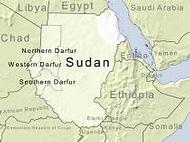Addis Ababa
23 August 2009
Four prominent Darfur rebel groups are forming a unified front to engage in future peace talks with Sudan's government, and urging other factions to join them. The front still faces big obstacles as members try to patch up differences that doomed previous unity efforts.
 |
President Obama's special envoy to Sudan J. Scott Gration was present for the signing. He called rebel unity a prerequisite for political talks on stopping a war the United Nations says has killed 300,000 people and displaced millions more.
"These efforts have been plagued by pitfalls in the past, and what I've seen with this group is they are working so hard to ensure that we learn from past attempts to unify, to get peace, and this time to make it lasting, durable; this time to make it a peace that doesn't have spoilers," he said.
Signers of the deal include the United Resistance Front, along with three splinter factions of the Sudan Liberation Movement, including one led by Paris-based Abdul Wahid Nur, who has distanced himself from previous unification efforts.
Ahmed Abdelshafi Toba, leader of one of the Sudan Liberation Movement factions, says work will begin immediately to patch up existing differences among the four, and to try to attract a broader cross-section of rebel groups.
"The country is undergoing a very difficult and delicate moment, which requires all of us to come together," he said. "We started this step of unifying the Sudan Liberation Movement with other movements in Darfur for the necessity and practicality, and then go with other like minded groups in the country to create a transformation of Sudan and to create the Sudan we all dreaming to have in near future."
Among prominent factions staying away from the Addis Ababa talks was the Justice and Equality Movement. Its leader, Khalil Ibrahim, recently lashed out at U.S. special envoy Gration, calling the American's effort to forge a rebel alliance 'naïve'. Ibrahim has suggested other rebel groups should instead join his movement.
In a sign of the underlying hostilities that still plague the rebel movement, United Resistance Front chairman Baha Idriss Abu Garda said Ibrahim's statements suggest he is out of touch with reality in Darfur.
"JEM Khalil, the wing of Khalil Ibrahim is isolating itself by saying they cannot negotiate with everybody, and by denying the existence of a real movement on the ground," he said. "Even they are not on the ground, we know that, and by saying nobody will talk about Darfur except themselves, that's the way they are isolating themselves."
The newly-formed rebel union still faces several massive challenges. Possibly the biggest will be agreeing on a leader acceptable to all. The URF's Abu Garda admits the leadership issue is far from settled, but he says all parties are going into the union with their eyes open.
Everybody knows splitting of the movement happened in Darfur for certain reasons and now we are going to discuss all those problems very deeply and find a solution for that, and we will discuss the problem of leadership, and we will find leadership that will lead all movement in good faith.
A senior Sudanese government official recently welcomed the rebel unity effort, saying it was difficult to negotiate with more than 20 separate factions. The government disputes UN casualty figures for the six year war. Khartoum's figures indicate only about 10,000 people have died.